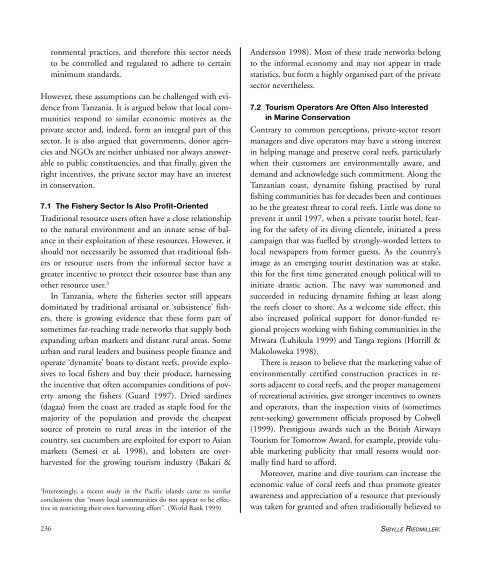You also want an ePaper? Increase the reach of your titles
YUMPU automatically turns print PDFs into web optimized ePapers that Google loves.
onmental practices, and therefore this sector needs<br />
to be controlled and regulated to adhere to certain<br />
minimum standards.<br />
However, these assumptions can be challenged with evidence<br />
from Tanzania. It is argued below that local communities<br />
respond to similar economic motives as the<br />
private sector and, indeed, form an integral part <strong>of</strong> this<br />
sector. It is also argued that governments, donor agencies<br />
and NGOs are neither unbiased nor always answerable<br />
to public constituencies, and that finally, given the<br />
right incentives, the private sector may have an interest<br />
in conservation.<br />
7.1 The Fishery Sector Is Also Pr<strong>of</strong>it-Oriented<br />
Traditional resource users <strong>of</strong>ten have a close relationship<br />
to the natural environment and an innate sense <strong>of</strong> balance<br />
in their exploitation <strong>of</strong> these resources. However, it<br />
should not necessarily be assumed that traditional fishers<br />
or resource users from the informal sector have a<br />
greater incentive to protect their resource base than any<br />
other resource user. 3<br />
In Tanzania, where the fisheries sector still appears<br />
dominated by traditional artisanal or ‘subsistence’ fishers,<br />
there is growing evidence that these form part <strong>of</strong><br />
sometimes far-reaching trade networks that supply both<br />
expanding urban markets and distant rural areas. Some<br />
urban and rural leaders and business people finance and<br />
operate ‘dynamite’ boats to distant reefs, provide explosives<br />
to local fishers and buy their produce, harnessing<br />
the incentive that <strong>of</strong>ten accompanies conditions <strong>of</strong> poverty<br />
among the fishers (Guard 1997). Dried sardines<br />
(dagaa) from the coast are traded as staple food for the<br />
majority <strong>of</strong> the population and provide the cheapest<br />
source <strong>of</strong> protein to rural areas in the interior <strong>of</strong> the<br />
country, sea cucumbers are exploited for export to Asian<br />
markets (Semesi et al. 1998), and lobsters are overharvested<br />
for the growing tourism industry (Bakari &<br />
3<br />
Interestingly, a recent study in the Pacific islands came to similar<br />
conclusions that “many local communities do not appear to be effective<br />
in restricting their own harvesting effort”. (World Bank 1999)<br />
Andersson 1998). Most <strong>of</strong> these trade networks belong<br />
to the informal economy and may not appear in trade<br />
statistics, but form a highly organised part <strong>of</strong> the private<br />
sector nevertheless.<br />
7.2 Tourism Operators Are Often Also Interested<br />
in Marine Conservation<br />
Contrary to common perceptions, private-sector resort<br />
managers and dive operators may have a strong interest<br />
in helping manage and preserve coral reefs, particularly<br />
when their customers are environmentally aware, and<br />
demand and acknowledge such commitment. Along the<br />
Tanzanian coast, dynamite fishing practised by rural<br />
fishing communities has for decades been and continues<br />
to be the greatest threat to coral reefs. Little was done to<br />
prevent it until 1997, when a private tourist hotel, fearing<br />
for the safety <strong>of</strong> its diving clientele, initiated a press<br />
campaign that was fuelled by strongly-worded letters to<br />
local newspapers from former guests. As the country’s<br />
image as an emerging tourist destination was at stake,<br />
this for the first time generated enough political will to<br />
initiate drastic action. The navy was summoned and<br />
succeeded in reducing dynamite fishing at least along<br />
the reefs closer to shore. As a welcome side effect, this<br />
also increased political support for donor-funded regional<br />
projects working with fishing communities in the<br />
Mtwara (Luhikula 1999) and Tanga regions (Horrill &<br />
Makoloweka 1998).<br />
There is reason to believe that the marketing value <strong>of</strong><br />
environmentally certified construction practices in resorts<br />
adjacent to coral reefs, and the proper management<br />
<strong>of</strong> recreational activities, give stronger incentives to owners<br />
and operators, than the inspection visits <strong>of</strong> (sometimes<br />
rent-seeking) government <strong>of</strong>ficials proposed by Colwell<br />
(1999). Prestigious awards such as the British Airways<br />
Tourism for Tomorrow Award, for example, provide valuable<br />
marketing publicity that small resorts would normally<br />
find hard to afford.<br />
Moreover, marine and dive tourism can increase the<br />
economic value <strong>of</strong> coral reefs and thus promote greater<br />
awareness and appreciation <strong>of</strong> a resource that previously<br />
was taken for granted and <strong>of</strong>ten traditionally believed to<br />
236<br />
SIBYLLE RIEDMILLER:


















